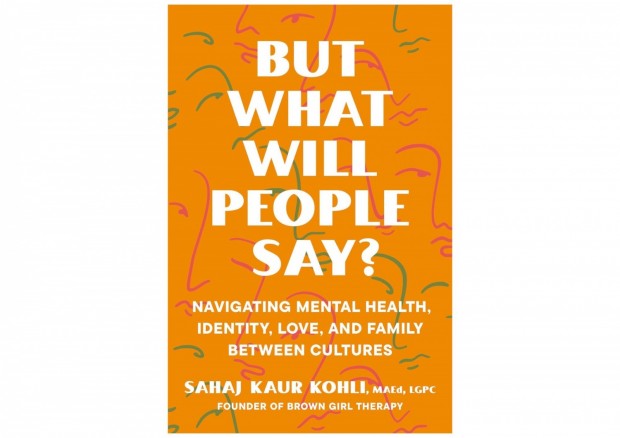Sahaj Kaur Kohli's New Book Tackles Cultural Expectations and Mental Health Challenges Among South Asians

Discover how psychotherapist Sahaj Kaur Kohli's new book "But What Will People Say?" addresses cultural expectations and mental health challenges among South Asians.(Photo : Amazon/Sahaj Kaur Kohli)
In her new book, "But What Will People Say?," Sahaj Kaur Kohli tackles the pervasive fear of societal judgment that many South Asians experience. She explores immigrant children's difficulties, like feeling ashamed or losing their cultural identity.
Kohli shares her own stories and advice from her work as a therapist to help readers understand their feelings and improve relationships with their families. While the book is mainly for children of immigrants, anyone can relate to its messages.
Exploring Cultural Expectations and Mental Health
In a recent CNN interview, Kohli talked about how societal pressures affect mental health discussions in immigrant families. She stressed how people often care more about what others think than about their own well-being. Kohli shared her struggles with depression and how hard it was to get help in a community where stigma is common.
Kohli's honest approach to family dynamics and self-growth makes her book helpful for anyone dealing with cultural expectations and finding themselves. By sharing her story and giving practical advice, Kohli hoped to create understanding and support in immigrant communities and encourage open talks about mental health.
Kohli grew up with two cultures: her parents' community-focused Indian culture and the more individualistic culture of the West. She talked about the daily struggle of balancing the values and expectations of these two cultures.
Growing up, Kohli found herself adapting her behavior depending on the social context. She aimed to fit in at school or with friends and be perceived a certain way. At the same time, at home or during cultural events, she embraced different behaviors influenced by her upbringing. This dual identity, shaped by both Western and Eastern values, created tension as she navigated various social environments.
Revolutionizing Mental Health Discourse
As a psychotherapist, Kohli offers a fresh perspective on mental health, diverging from conventional Western therapeutic methods. Raised by Indian immigrant parents, Kohli noticed a lack of diversity in self-help literature, motivating her to write the book to address this gap. She sought to infuse cultural nuance into wellness discussions in a space predominantly occupied by White and individualistic narratives.
In 2019, Kohli established Brown Girl Therapy. This Internet-based platform disrupts the conventional norms in therapy and mental health care. Utilizing her own experiences, client narratives, and input from the community, Kohli explores topics like the internalization of cultural standards and the challenge of balancing cultural heritage with the need for acceptance. This resource provides an alternative to conventional therapy methods, catering to individuals in search of culturally inclusive self-help materials.
Understanding Immigrant Children
For immigrant parents striving to comprehend their children better, Kohli emphasized that curiosity, connection, and compassion are essential. She suggested avoiding assumptions and engaging in dialogue with children to gain insights into their experiences and perspectives.
Kohli advocated embracing children's bicultural identity as a protective factor against mental health issues. She encouraged parents to support their children in maintaining ties to their cultural roots without fearing assimilation. Kohli also noted that it is crucial to recognize the challenges immigrant parents may face due to their own fears and reflect on how these fears may influence their parenting approach.
Kohli shared personal insights into her upbringing, highlighting her parents' fears and their impact on their relationship and underscoring the significance of forging a new connection with them later in life. She urged parents to examine their concerns and their effects on their relationship with their children, promoting an approach to parenting rooted in openness and self-awareness.
RELATED ARTICLE: 5 Books Exploring the Multifaceted Asian American Experience
© 2023 Books & Review All rights reserved.
Popular Now
1
Books to Read After 'Fourth Wing': Top Picks for Fantasy and Romantasy Fans

2
‘The Secret Public’ by Jon Savage Book Review: An Insightful Look Into the LGBTQ Influence

3
Stephanie Regalado's 'If They Only Knew' Column Is Now A Book, Unleashing 60 Anonymous True Stories to Empower Women

4
'No Wire Hangers' Scene That Almost Did Not Happen: New Book Reveals Faye Dunaway's Struggles

5
Rare First Edition of Aphra Behn's Novel 'Oroonoko' Discovered in Kent: A Historic Literary Find

Latest Stories
Book Reviews
‘The Secret Public’ by Jon Savage Book Review: An Insightful Look Into the LGBTQ Influence

Book News
Stephanie Regalado's 'If They Only Knew' Column Is Now A Book, Unleashing 60 Anonymous True Stories to Empower Women

Book News
'No Wire Hangers' Scene That Almost Did Not Happen: New Book Reveals Faye Dunaway's Struggles

Book Reviews
‘The Perfect Couple’ by Elin Hilderbrand Book Review: A Captivating Summer Mystery

Book News
New Book ‘The Franchise’ Reveals Penguins President Kyle Dubas’ ‘Biggest Mistake’ as Maple Leafs GM











